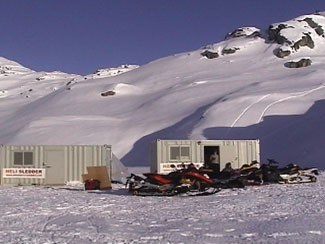For Dave Mills it’s the culmination of a dream, but for some backcountry users it might come as a shock.
Land and Water B.C. has granted Mills, a former real estate developer, a 25,000-acre tenure on the Pemberton Ice Cap for an operation called Whistler Heli-Sledder.
Mills will be charging $1,200 a day per person to fly people to the glacier so he can then take them snowmobiling.
"I’ve been pregnant with this for two and half years with the tenure process and in the past two and a half weeks since we launched it the film companies are just hammering us," said Mills.
"We’re just running promo stuff right now and assessing the protocols and kind of setting things up and not running tours. Because it’s the kind of business that if I stub my toe now, i.e. if some tourist rides their sled into a crevasse, it’d be disastrous and it’s so easy to do that up there."
Public knowledge about this tenure is not widespread but the Squamish-Lillooet Regional District knew about it and so did most of the other commercial recreation operators in Whistler, because Mills made presentations to all of them.
The SLRD tried to get the application stopped by arguing that Mills’s base camp would require rezoning, but the effort failed.
Mills got many of the other commercial operators on side by offering to put some emergency services and provisions on the ice cap for people who got lost or injured while hiking or sledding in the area.
The fact that Mills has been able to get this tenure application through is a testament to his determination but it also raises several questions about LWBC and their plan for the Whistler/Pemberton backcountry.
Doug O’Mara from Whistler Heli-Skiing said it would be unfair to "pick on one commercial operator" but he indicated that somebody should be asking LWBC some serious questions.
O’Mara said it was important to point out that Whistler Heli-Skiing still has unresolved issues with LWBC dating back 20 years.
"This process is dealt with by LWBC, they are the ones regulating it and they make the decisions for licenses of occupation," said O’Mara.
"There are a number of issues with commercial recreation tenures in the corridor and the biggest issue is that LWBC has been issuing tenures licensing of occupation that overlap each other. And overlapping reduces the quality of the product and carrying capacity and increases the impact it could have on the public."
Mills’s application was advertised and public feedback was sought, but O’Mara said he would still like to see LWBC take better charge of the situation.
"We would like to see LWBC manage the backcountry in a more effective manner and that means a number of things," he said.
"Our feeling is there is enough room for all users but it absolutely has to involve long term effective management and it requires co-operation from the public, government and responsible operators."
LWBC’s commercial recreation manager, Kevin Lee, said LWBC gets six dollars every time a commercial recreation operator takes a tourist for a ride.
But Lee disagreed that LWBC had stacked the Whistler/Pemberton backcountry with tenure operators.
"In terms of use, my gut feeling is that (Whistler/Pemberton) hasn’t reached that capacity yet and part of the reason why I say that is that if we had reached those levels of concern we would have been deluged with mail," said Lee.
"But at this time I think it’s manageable because, first of all, there’s not as many operators in that area as some people might think there is.
"In the area where Mills is operating, he’s the only one, and as for the other operators they’re operating in other defined areas.
"I could see people wanting to protect their turf by saying that we’ve reached capacity… but until there’s other applications on top of what’s already there that’s hard to justify at this time."




